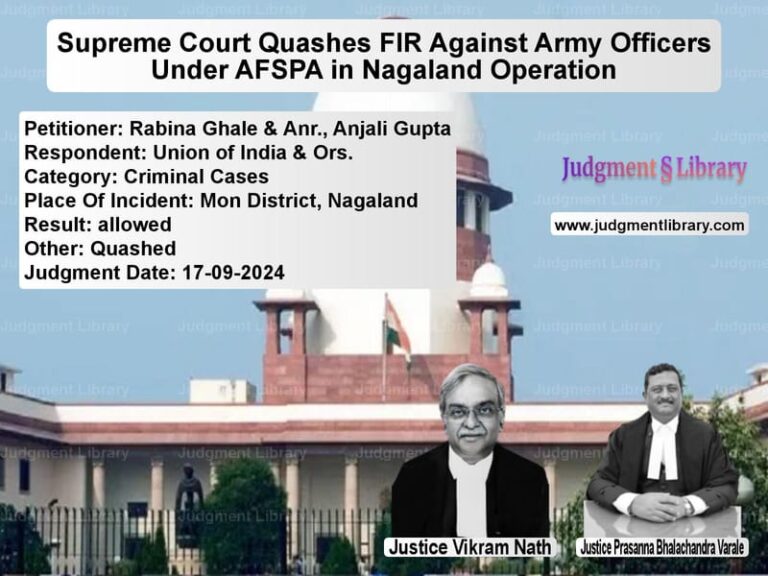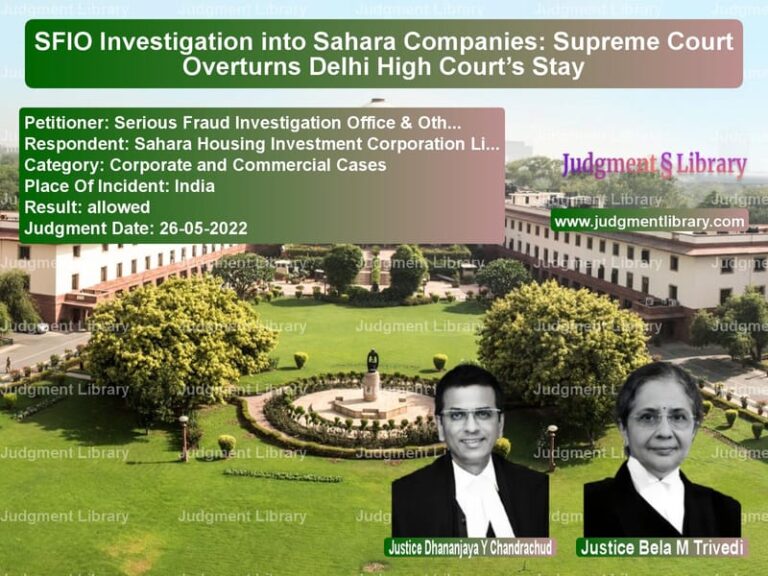Supreme Court Dismisses Appeal of Lt. Col. Vijaynath Jha Against Armed Forces Tribunal Decision
The case of Lt. Col. Vijaynath Jha v. Union of India & Others involved a dispute over the jurisdiction of the Armed Forces Tribunal (AFT) in matters related to the Directorate General of Quality Assurance (DGQA). The Supreme Court dismissed the appeal, affirming that the AFT does not have jurisdiction over claims related to permanent secondment in the DGQA.
Background of the Case
Lt. Col. Vijaynath Jha, the appellant, was commissioned in the Indian Army on March 11, 1989, in the Engineering Discipline. He was later selected and inducted into the Directorate General of Quality Assurance (DGQA) on May 31, 2004. After completing his initial two-year tenure, he was transferred to the Directorate of Indigenization under the Directorate General of Electrical and Mechanical Engineering (DGEME).
During his service in DGQA, a Quality Assurance Selection Board (QASB) was convened to select officers for permanent secondment. The appellant was found unfit for permanent secondment and was denied further tenure in DGQA.
Feeling aggrieved, the appellant filed a statutory complaint with the Ministry of Defence, seeking permanent secondment in DGQA. The Ministry rejected his complaint through an order dated December 17, 2007. Consequently, he filed O.A. No. 104 of 2011 before the Armed Forces Tribunal (AFT), Regional Bench, Lucknow, challenging the rejection of his complaint.
Arguments by the Petitioner
The appellant contended that:
- DGQA officers are drawn from the Armed Forces on tenure postings, and they should be considered for permanent secondment as per government policies.
- DGQA is an organization within the Ministry of Defence, comprising both civilian and military personnel, which should bring it under the jurisdiction of the AFT.
- Under Section 3(o)(iv) of the Armed Forces Tribunal Act, 2007, his case falls within the jurisdiction of the AFT as he was subject to the Army Act, 1950.
- Judgments from other AFT benches had previously ruled in favor of military officers in similar disputes.
Arguments by the Respondents
The Union of India, through its counsel, argued that:
- The appellant’s claim was not covered under the definition of “service matters” as per Section 3(o) of the AFT Act.
- The decision to deny permanent secondment was taken by the DGQA Selection Board and was not an action under the Army Act or Army Rules.
- The AFT’s jurisdiction is limited to service matters arising within the framework of the Army Act, Navy Act, and Air Force Act, and does not extend to policies governing civilian organizations such as DGQA.
- Precedents such as Union of India v. Colonel G.S. Grewal (2014) and Mohammed Ansari v. Union of India (2017) clearly established that disputes regarding permanent secondment in civilian organizations fall outside the AFT’s jurisdiction.
Supreme Court’s Observations
The Supreme Court upheld the AFT’s ruling that it had no jurisdiction over the appellant’s claim. The Court made the following key observations:
1. Service Conditions Must Fall Under the Army Act
The Court stated:
“The Armed Forces Tribunal Act, 2007 was enacted to adjudicate disputes concerning service matters of persons subject to the Army Act, 1950, the Navy Act, 1957, and the Air Force Act, 1950. Matters concerning civilian organizations such as DGQA do not fall within its jurisdiction.”
2. The AFT Cannot Rule on DGQA’s Policies
The Court noted that DGQA’s recruitment, appointment, and promotion guidelines are distinct from the Army’s regulations:
“The terms and conditions governing service officers in DGQA are not a creation of the Army Act or Army Rules, and thus do not come under the jurisdiction of the Armed Forces Tribunal.”
3. Precedents from Similar Cases
The Court relied on previous rulings where AFT’s jurisdiction was examined in similar matters:
- Maj. General S.B. Akali v. Union of India: AFT held that issues related to DGQA do not fall under the Tribunal’s jurisdiction.
- Col. G.S. Grewal v. Union of India: The Supreme Court ruled that secondment issues related to civilian defense establishments fall outside the AFT’s purview.
- Mohammed Ansari v. Union of India: The Court clarified that only matters governed by military laws fall within the AFT’s jurisdiction.
Final Judgment
The Supreme Court dismissed the appeal, holding:
- The Armed Forces Tribunal was correct in rejecting the petition as not maintainable.
- The appellant’s claim for permanent secondment in DGQA was an administrative matter that did not involve any breach of military service rules.
- The appellant was given liberty to pursue his claim before the appropriate authorities outside the jurisdiction of AFT.
Conclusion
This ruling reinforces the principle that the Armed Forces Tribunal cannot entertain disputes related to civilian defense organizations such as DGQA. The judgment sets an important precedent in distinguishing military service matters from civilian administrative disputes and provides clarity on the scope of AFT’s jurisdiction.
Petitioner Name: Lt. Col. Vijaynath Jha.Respondent Name: Union of India & Others.Judgment By: Justice Ashok Bhushan.Place Of Incident: Directorate General of Quality Assurance (DGQA), India.Judgment Date: 18-05-2018.
Don’t miss out on the full details! Download the complete judgment in PDF format below and gain valuable insights instantly!
Download Judgment: Lt. Col. Vijaynath J vs Union of India & Oth Supreme Court of India Judgment Dated 18-05-2018.pdf
Direct Downlaod Judgment: Direct downlaod this Judgment
See all petitions in Public Sector Employees
See all petitions in Recruitment Policies
See all petitions in Judgment by Ashok Bhushan
See all petitions in dismissed
See all petitions in Declared Infructuous
See all petitions in supreme court of India judgments May 2018
See all petitions in 2018 judgments
See all posts in Service Matters Category
See all allowed petitions in Service Matters Category
See all Dismissed petitions in Service Matters Category
See all partially allowed petitions in Service Matters Category







